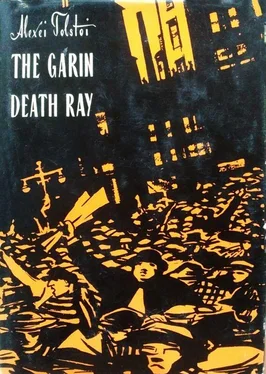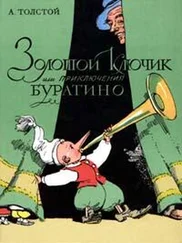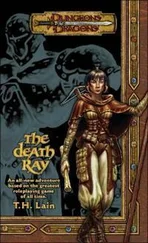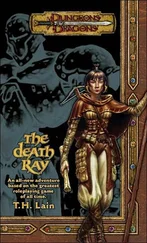The gold pencil hovered over the writing-pad.
"Your name, sir?"
"Pyankov-Pitkevich."
"The object of your visit?"
"Tell Mr. Rolling that I am authorized to negotiate concerning Engineer Garin's apparatus; he knows all about it."
The secretary immediately disappeared. A minute later Garin passed through the walnut doors into the Chemical King's room. Rolling was writing. Without raising his eyes he offered his visitor a seat. Then, still without raising his eyes:
"Petty financial operations are conducted by my secretary." With a weak hand he picked up the blotter and jabbed it on what he had written. "Nevertheless I'm ready to listen to you. I give you two minutes. What's new about Garin?"
Garin crossed his legs and placed his hands on his knee.
"Engineer Garin wants to know whether you are aware of the exact purpose for which his apparatus is designed," he said.
"Yes," answered Rolling, "as far as I know the apparatus may be of some interest in industry. I have spoken with some of the members of the board of our concern, they agree to buy the patent."
"The apparatus is not intended for use in industry," said Garin, brusquely. "It is a machine of destruction. It is true it may be used in the iron and steel and mining industries, but at the present moment Engineer Garin has different ideas."
"Political?"
"Hardly. Engineer Garin isn't very interested in politics. He hopes to establish the particular social system he finds to his liking. Politics—a mere bagatelle, a function."
"Where does he want to establish his system?"
"Everywhere, naturally, on all five continents."
"Oho!" exclaimed Rolling.
"Engineer Garin is not a Communist, don't worry. Neither is he fully on your side. I repeat, he has very extensive plans. Engineer Garin's apparatus will enable him to put into effect the whims of the wildest fantasy. The apparatus has already been built and can be demonstrated even today."
"Hm-m!" said Rolling.
"Garin has been watching your activities, Mr. Rolling, and finds that you have scope but lack a great idea. This business of the chemical concern, and the chemical warfare in the air, and the conversion of Europe into an American market... That's all petty, there's no central idea. Engineer Garin is offering you a partnership."
"Are you, or is he, mad?" asked Rolling. Garin laughed and rubbed the side of his nose energetically with a finger.
"You see, it's already a good sign that you have listened to me not two minutes, but nine and a half."
"I'm prepared to offer Engineer Garin fifty thousand francs for his invention," said Rolling, again beginning to write.
"I understand your offer this way: you intend, either by cunning or by force, to get hold of the apparatus and then deal with Garin in the same way as you dealt with his assistant on Krestovsky Island. Am I right?"
Rolling put down his pen. Only two red patches on his face betrayed his excitement. He took a smoking cigar from the ash-tray, leaned back in his chair and stared at Garin with dull, expressionless eyes.
"If we assume that that is just what I am going to do with Engineer Garin, then what?"
"Then, it seems, Engineer Garin is mistaken."
"In what?"
"In assuming that you were a crook on a larger scale," Garin said slowly, syllable by syllable, smiling and looking impudently at Rolling. The latter merely blew out a cloud of smoke and waved his cigar in front of his nose.
"It would be foolish to share profits with Engineer Garin when I can take the whole hundred per cent myself," he said. "Well, in order to put an end to this, I offer a hundred thousand francs and not a single centime more."
"You're not at all consistent, Mr. Rolling. You're not risking anything. Your agents Semyonov and Tyklinski have discovered where Garin lives. Report to the police and they'll arrest him as a Bolshevik spy. Then Semyonov and Tyklinski can steal the apparatus and the drawings. All that won't cost you more than five thousand. And so that Garin can't try to remake the drawings you can send him back to Russia through Poland under escort and have him killed at the frontier. Simple and cheap. Why do you want to waste a hundred thousand francs?"
Rolling got up, glanced at Garin out of the corner of his eye and began walking up and down, his patent-leather shoes sinking into the silver carpet. Suddenly he pulled his hand out of his pocket and snapped his fingers.
"A cheap game," he said, "you're bluffing. I've thought out all possible combinations five moves ahead. There's no danger. You're just a cheap swindler. Garin is checkmated. He knows that and has sent you to bargain. I won't give two louis d'ors for his patent. Garin has been followed home and he's in my hands. (Rapidly he glanced at his watch and just as rapidly thrust it back into his waistcoat pocket.) Get to hell out of here!"
At that moment Garin also got up and stood beside the desk with his head bowed. When Rolling sent him to hell he passed his hand over his hair and said in a hollow voice, like a man who had unexpectedly fallen into a trap:
"All right, Mr. Rolling, I agree to your terms. You spoke about a hundred thousand..."
"Not a centime!" shouted Rolling. "Get out of here before you are thrown out."
Garin pulled at his collar with his fingers and his eyes began to roll. He staggered.
"Don't try any tricks," roared Rolling. "Get out!"
Garin groaned and fell sideways on the desk. His right hand dropped on to the papers Rolling had been writing and grabbed them spasmodically. Rolling jumped to the electric bell. In an instant the secretary appeared.
"Throw that thing out of here..."
The secretary crouched like a leopard, his elegant moustache bristled and his steel muscles flexed under his thin jacket. Garin, however, was already edging away from the desk and bowing to Rolling. He ran down the marble staircase on to the Boulevard Malesherbes, jumped into a taxi with a raised top, shouted an address, closed both windows, pulled down the green blinds, and laughed a short, sharp laugh.
He pulled a crumpled sheet of paper out of his pocket and carefully spread it out on his knees. On that crumpled paper (it was torn from a big writing-pad) there were business notes for the day in Rolling's scrawling hand. Apparently, when Garin entered his office, Rolling had been on the alert and his hand had begun to write mechanically, betraying his secret thoughts. Three times, one after the other, was written an address: "Rue des Gobelins, 63. Engineer Garin." (This was Victor Lenoir's new address that Semyonov had just reported over the phone.) Then: "Semyonov—five thousand francs."
"Luck! What devilish luck!" whispered Garin, carefully straightening out the paper on his knee.
Ten minutes later Garin left his car on the Boulevard Saint-Michel. The plate-glass windows of the Cafe Pantheon were raised. At a table at the back of the cafe sat Victor Lenoir. When he saw Garin he raised his hand and snapped his fingers.
Garin hurriedly sat down at his table, back to the light. It seemed as though he were sitting opposite a mirror: Victor Lenoir's pointed beard, soft hat, bow tie, and striped jacket were exactly the same.
"Congratulate me on my success! Quite phenomenal!" said Garin, with a smile in his eyes. "Rolling agrees to everything. He will meet all the expenses himself. When we begin to exploit the machine fifty per cent gross to him and fifty to us."
"Have you signed a contract?"
"We'll sign it in three or four days. We must put off the demonstration of the apparatus. Rolling's terms are— he'll sign the contract only after he's seen the machine at work."
"Will you stand a bottle of champagne?"
"Two, three, a dozen."
Читать дальше





![Алексей Николаевич Толстой - Хождение по мукам [litres]](/books/26263/aleksej-nikolaevich-tolstoj-hozhdenie-po-mukam-litr-thumb.webp)





![Алексей Николаевич Толстой - Гиперболоид инженера Гарина. Аэлита [Художник Г. Зубковский]](/books/423486/aleksej-nikolaevich-tolstoj-giperboloid-inzhenera-ga-thumb.webp)
